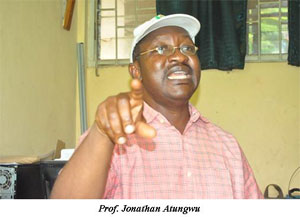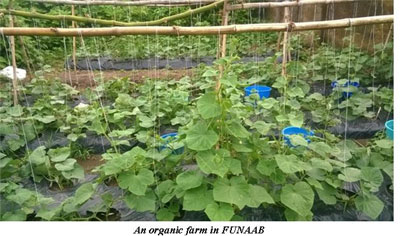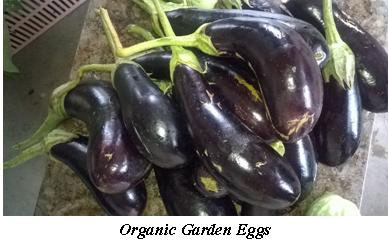Professor Jonathan Atungwu, the Head, Department of Crop Protection, College of Plant Science and Crop Production (COLPLANT), has described organic agriculture as safer, tastier, more nutritious, friendlier to the environment, and capable of bringing man closer to God.

The Don noted that those who eat or work in an organic environment were always looking fresh and younger than their counterparts that relied on artificial sources. According to him, organic agriculture is involved in raising plants and animals in a sustainable manner without the use of chemicals, which are man-made and poisonous. He noted that this production system sustained the health status of soils, ecosystems and people, based on ecological processes, biodiversity and cycles adapted to local conditions.
According to Professor Atungwu, a former National Coordinating Scientist, Organic Agriculture Project in Tertiary Institutions in Nigeria (OAPTIN), formal organic agriculture started in Nigeria in 2004, was spear-headed and promoted by FUNA AB, adding that till date, the University was still leading in the field of organic agriculture. He noted that in 2005, a conference was held on organic agriculture and FUNAAB coordinated the national and regional projects in West Africa.
AB, adding that till date, the University was still leading in the field of organic agriculture. He noted that in 2005, a conference was held on organic agriculture and FUNAAB coordinated the national and regional projects in West Africa.
Noting that organic agriculture had contributed to the development of the University, the former Coordinator, International Summer School on Organic Agriculture, stated that the project had added a lot of advancement that had helped to boost academic activities, stating that it had also been able to formulate the curriculum for organic agriculture training on degree programmes through its Pioneer Team Leader, Professor Isaac Aiyelaagbe. According to him, the curriculum would teach the undergraduate, postgraduate students and professors, who are interested in knowing more about organic agriculture. He lamented that though a Centre for Organic Agricultural Research had been established in the University, it had yet to be put into full operation, adding that very soon, FUNAAB would have a full-fledged Department of Organic Agriculture.
The Professor of Plant Nematology and Deputy Editor, Journal on Organic Agriculture and Environment, gave a distinctive difference between organic and conventional agriculture, to include the use of synthetic chemical fertilisers to promote plant growth by farmers, while organic farmers would rather apply natural fertilisers, such as manure or compost, to feed the soil and the plants, adding that where the conventional farmer would use insecticides for pest control, the organic farmer would make use of beneficial insects, birds or plants like the Neem leaf (Dogoyaro), Scent leaf and Bitter leaf. The Don added that where the conventional farmer would have used herbicides for weed control, the organic farmer would rotate crops and use other farming methods to manage the weeds.
He revealed that producers of organic beef, pork, poultry and other meat products were using preventive measures such as rotational grazing, a wholesome diet and clean housing in contrast to the conventional producers, who give animal hormones to spur growth and antibiotics to prevent disease with its residual effect. Professor Atungwu noted further that the health risks associated with exposure to some pesticides, fungicides and herbicides was another main consideration when looking at the differences between organic and conventional produce as some of them were linked to cancer and other diseases.
Throwing light on the general plans for organic agriculture in Nigeria, the alumnus of the University, said that the future of orga nic agriculture was very bright and capable of giving Nigerians safe food. For this reason, many farmers had been trained in organic agriculture, both small and big time farmers, who had attended the University’s International Summer School, hoping that with time, there would be organic stores, like what obtained in the developed countries, where people could walk-in to buy their organic products and there would be organic produce all-year-round while citing the small organic store established in FUNAAB. He added that since people were asking for organic products, they could get always them regularly from the campus organic store.
nic agriculture was very bright and capable of giving Nigerians safe food. For this reason, many farmers had been trained in organic agriculture, both small and big time farmers, who had attended the University’s International Summer School, hoping that with time, there would be organic stores, like what obtained in the developed countries, where people could walk-in to buy their organic products and there would be organic produce all-year-round while citing the small organic store established in FUNAAB. He added that since people were asking for organic products, they could get always them regularly from the campus organic store.
He also noted that a scheme, known as the Community Organic Box Scheme (COBS), which started in the University since January 30, 2014, had grown and met the demand for organic products throughout the year in a sustainable manner, adding that on a weekly basis, the organic produce was shared to members. Professor Atungwu, who is the Coordinator of COBS, further added that FUNAAB was a training and capacity building ground for research and training of farmers and other interested producers. Professor Atungwu noted that the aim of the project was not only to grow organic produce on commercial basis in the University, but to train as many people as possible, who would in turn; produce many organic products on a commercial scale.
Professor Atungwu said that organic agriculture operates on four basic principles, namely principle of health; where they look at the health of the soil to make sure that the soil was healthy and if so, the plants would be healthy, the animals would be healthy, the people would be healthy and the whole planet would also be healthy, adding that the principle of ecosystem should operate in a manner that would be healthy for humanity, as he charged all to think of a safer future for the nation’s generation that is safe.
The Don enumerated the benefits of organic agriculture as products that provide high quality safe food to help man live healthier, adding that they have antioxidants, which would help in breaking down fat, as he noted that it provided better ecosystem, which is unpolluted by increasing the income of farmers, particularly in developed countries, where they appreciate organic products and sell their produce higher than the conventional ones. He, therefore, called on the government to seriously think on promoting organic agriculture in the country in the area of exportation, in order to increase foreign reserves with the assurance that such efforts would give nutritious and pharmaceutical values to the society.
